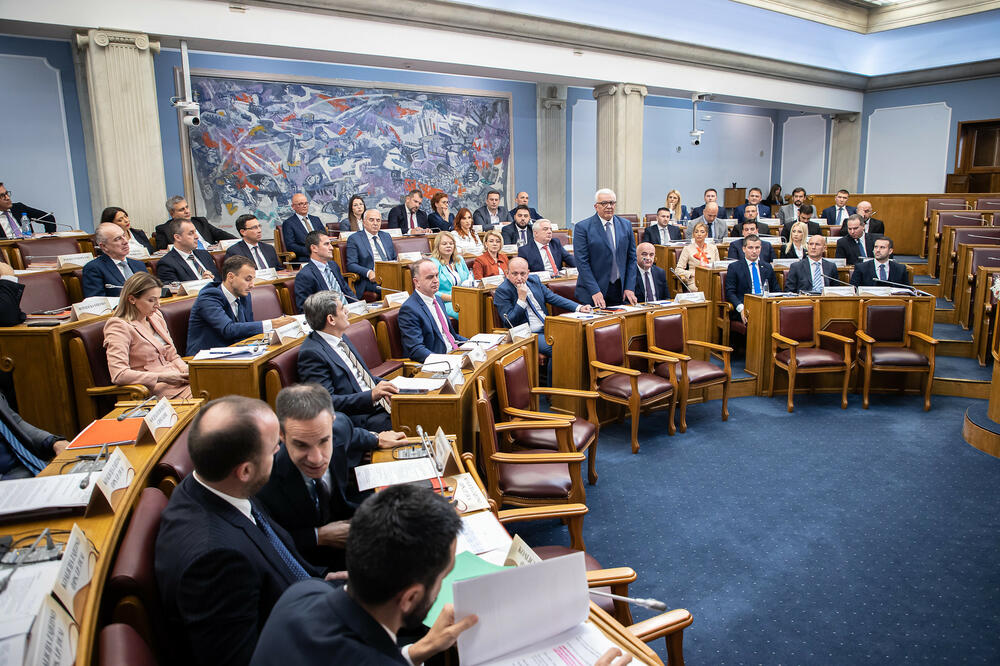Chetniks have really multiplied in Montenegro lately. So much so that, judging by the public and above all political scene, there are countless more of them than in the time of Baja Stanišić and Pavle Đurišić, who, I believe, are turning in their graves like propellers whining all the time: You, Chetnik brothers, have been until now , where you '41?
Cockades and black flags with a corpse's head, however, are also flown in Serbia and Republika Srpska where, also, this ideology has a significant number of followers. However, what is specific here is that non-patrimony is viewed, first of all, from the perspective of a key identity issue and the greatest danger to the national being of Montenegrins.
And indeed, the majority of admirers and followers of the Chetnik ideology by default believe that Montenegrins are actually misguided Serbs and that they should be returned to the "Serbian world" - by grace or by force. Seen from that angle, all those who point out that the specter of Chetniks is (again) circling Montenegro could be right. Well, there is a bit of exaggeration, but let's ignore for a moment the favorite discipline in this region - counting ours and theirs and let's agree that every nation and state must and should take care of preserving its own ethnos. Numerically smaller nations have always been and will be exposed to attempts at assimilation, and the concern of all those who believe that "Serbs" are a serious threat to Montenegrin ethnicity should be respected.
This, however, should not prevent us from asking why the fight against the Chetniks as a key attacker on the national identity of unadulterated Montenegrins became louder as it became certain that Duke Rajo would become the speaker, and ZBCG would support the government of Milojko Spajić. The crescendo was reached on that famous parliamentary night when there was almost no MP from the DPS ranks who did not defend Montenegro against the coming Chetnik scourge.
And here we come to the key issue, actually the coward's egg that DPS and its coalition partners are trying to impose as a dominant narrative. Hiding their political impotence and inability to devise an effective way to oppose the parliamentary majority, trapped by their past, lacking an idea how to deal with the pile of corpses that fall out of the closets of their thirty-year rule every day, they found salvation in mass masturbation and whining that it was threatened, nor more or less, the national identity of Montenegrins. And they are there to save what can be saved from Montenegro. It is only necessary that they come to power again.
To be clear, I agree, in general, with the statements about the aspirations of certain circles in Montenegro and Serbia, and especially in the SPC, to cancel the Montenegrin national identity and state independence. What is cheap political subterfuge is an attempt to build the identity issue exclusively and only on anti-Chetniism, because it is actually a story about form without content, political propaganda that not only does not consider this serious challenge facing the Montenegrin state, but is much more dangerous, it simply hides the real situation. And, it seems to me, an acquaintance of mine described him, albeit on a rather mundane level: Serbian folk stars howl in cafes, at matches in the middle of Podgorica there are more fans of Serbian clubs than of Montenegrin ones, we read Serbian writers, watch Serbian films...
The identity of a nation is a complex and multi-layered concept that includes various elements such as language, culture, history, tradition, customs, religion, territory and sense of belonging. According to one of the definitions, a nation is a community of people who share certain characteristics and values, and the feeling of belonging to a nation usually creates a sense of community and identity among its members.
Without getting into the argument about whether the DPS all along produced propellant for the rise of what is called Serbo-Hetism, it does not take much wisdom to see that the careless attitude towards Montenegrin culture, language, tradition or the church over a long period of time is actually the most serious erodes the Montenegrin national identity. DPS and Milo Đukanović, to be fair, are among the most deserving of the re-territorial determination of Montenegro and the creation of an independent state, as well as accession to the NATO alliance, which resolved the issue of territory as one of the most important elements of Montenegrin identity for a long period of time.
These merits, however, cannot and must not be an alibi and looking through the fingers when it comes to the factual situation in other areas that make up one nation. It is even less necessary to turn a blind eye to the attempt to, by pounding the chests of heroes in front of the coming Chetnik hordes of Duke Raj, obscure the essential question of why Montenegro and ethnic Montenegrins feel, if they do, that their national identity is threatened.
Instead of a daily confrontation with the Chetniks, at this moment a dispassionate and objective insight could be much more effective for preserving identity. At the same time, it is necessary to avoid the dangerous trap into which awakened national party activists are pushing Montenegrin nationalism as an answer to the Chetniks, the "Serbian world" and the pretensions of the "Church of Serbia". Acceptance of that mode - nationalism on top of nationalism, at this moment ethnic Montenegrins are in a much greater danger to their national identity than all imaginary and real Chetnik divisions.
Bonus video:





